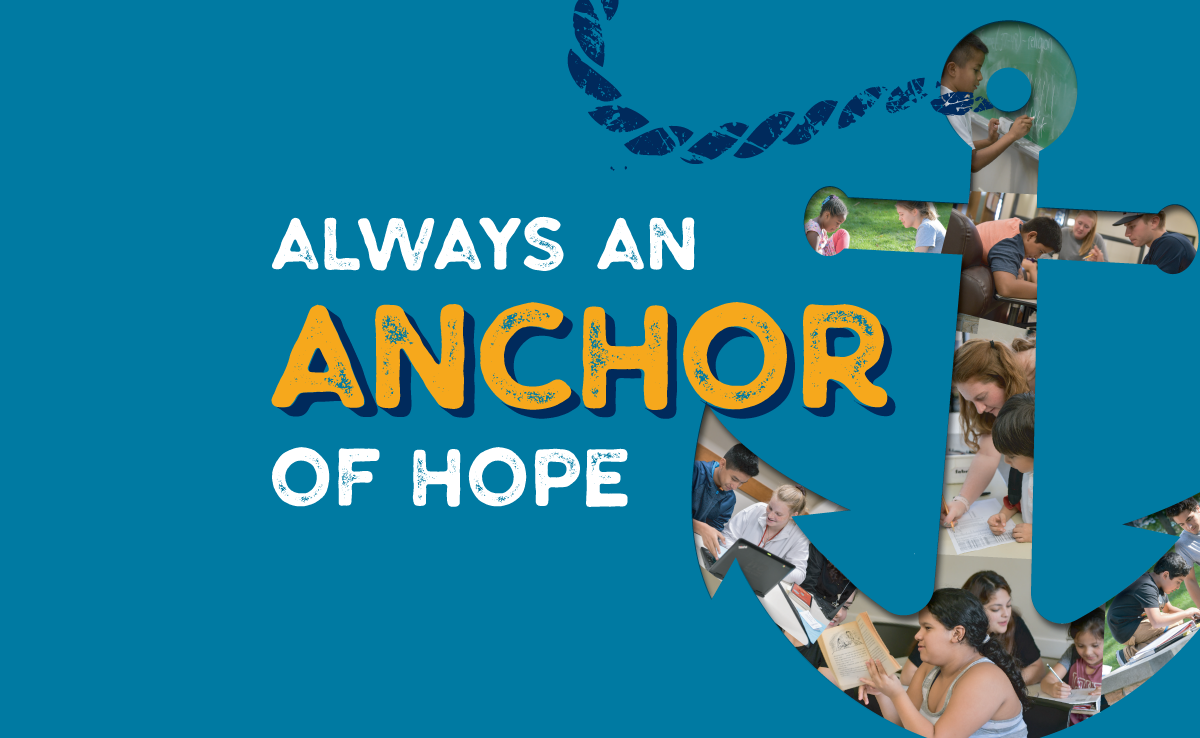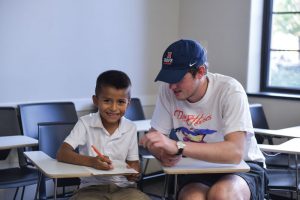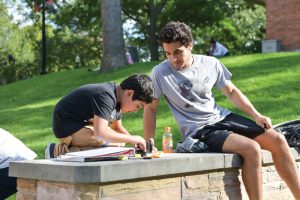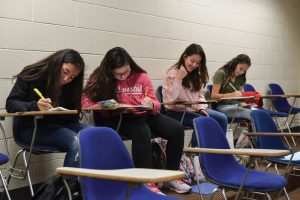Always an Anchor of Hope
Nearly a decade ago, Jazmin Martinez was a shy, quiet elementary student in Holland, Michigan, who was nervous about an upcoming choir concert at her school.
At the time, Jazmin was receiving tutoring support through the Children’s After School Achievement (CASA) program that meets at Hope. A student mentor from the college offered to help her get ready for the concert.
“She helped me practice the song and then she showed up at my concert,” Jazmin said. “Isn’t that so beautiful? A college student was going to my elementary-singing concert when she could be at a college event with her friends, studying or working.”
This vignette is but a snapshot of the type of support Jazmin and other area students have received through three community outreach programs hosted on the Hope campus during her formative years: CASA; a middle school program known as Step Up; and Upward Bound, a federally-funded initiative that focuses on high school students seeking to become the first generation in their family to go to college.
Today, Jazmin is a freshman at Hope, with dreams of possibly becoming a doctor. And she wants to help those in Holland get the same type of academic support that helped lead her to the college.
“The opportunity to not only give back to programs that greatly influenced my life but the thought of being able to inspire another student in my community was the most attractive aspect Hope College has to offer me,” she said.
Hundreds of students from the Holland area with backgrounds similar to Jazmin’s have realized their academic and career goals through the support of CASA, Step Up and Upward Bound. CASA and Upward Bound both recently marked milestone anniversaries: CASA celebrated 30 years in 2017, while Upward Bound just turned 50 — making it one of the oldest continuous Upward Bound programs in the country.
Two longtime Hope staff members who have personally witnessed many of these transformations – CASA director Fonda Green and Upward Bound director Liz Colburn – say the college’s backing of these programs, including the engagement of not only hundreds of students as tutors through the years but the entire Hope community, has been critical to the success of their students.
Students achieve academic and life success, continuing the vision expressed by the Rev. A.C. Van Raalte upon the 1851 founding of the Pioneer School from which Hope grew:
This is my Anchor of Hope for this people in the future.
“We have so many experts on campus. We have the whole education department, which can help us with reading training for the tutors, and give us advice on working with kids who are struggling. We have the math folks who do the same,” said Green, who is in her 21st year as CASA director. “We have the whole science division, which brings in STEM projects for our students. We have faculty and staff all over this campus who support what we’re doing and value the fact we are bringing in community young people who provide a lot of diversity and a lot of relevant learning experiences for the Hope students.”
Colburn, who started as a teacher in the Upward Bound program in 1981, echoes Green’s sentiments.
“We have the added value of professors, who if you give them a call and say, ‘Can you help out with this, do you have an idea about this,’ they’re right there. I’m not sure other programs have that relationship with their institution,” Colburn said.
CASA, which started in 1987 as a community-based program through First United Methodist of Holland, provides extra academic support for elementary-age students. It became part of the college in 1989, and now offers assistance to about 110 students from Holland Public Schools, as well as Vanderbilt Charter Academy, Corpus Christi Catholic School, and Woodside, North Holland and Lakewood elementary schools in the West Ottawa district north of the Holland city limits.
“It’s completely focused on academics. These kids need an additional boost to get that work done and to succeed,” Green said. “Otherwise, without that extra support and extra time after school with the one-on-one attention twice a week, there’s a good chance they are not going to get up to par with their school work.”
Every child in CASA is paired with a Hope-student tutor.
And while the program provides an ideal opportunity for education majors to both give and learn, they’re not the only ones that help out.
“We throw the door open. We get the pre-health profession folks, biology (majors), engineering students, we’ll get nursing majors, we’ll get English students and, we’ll get dance students,” Green said.
Maddie Wabel, a junior psychology major from Linden, Michigan, is in her third year as a CASA tutor. She values that the support that she and the other tutors provide goes beyond academics.
“We are giving the children role models and people they can go to with problems or for advice,” Wabel said. “We are giving them people to look up to, who care about them and who will be there for them if they need help or just someone to talk to.”
More than 90 students from Holland, West Ottawa and Fennville high schools attend Upward Bound, which has been administered through Hope and has also received funding through the U.S. Department of Education continuously since the program began in 1968. Under the federal funding requirements, at least two-thirds of students must be first-generation college candidates and low-income. Students are required to attend twice weekly, but they often come in more than twice a week depending on their academic needs, Colburn said.
While CASA places greater emphasis on one-on-one tutoring, such support in Upward Bound is more group-based. “We group the students according to academic needs. If we’ve got three students who are taking calculus, and they all indicate that they need help with the class, we will group those three with a tutor who’s an expert in that area,” Colburn said.
In addition to the tutoring support, Upward Bound assists students with the college search and selection process, including working with parents on financial aid forms.
Students also go on college visits, complementing the experience with a college environment provided by their time on the Hope campus. “They’re able to see a small private school versus a larger public school versus a community college,” Colburn said.
Ninety percent of graduates from the Upward Bound program over the last five years have gone on to college, with 71 percent of those students graduating within four to six years, Colburn said.
Even as the college’s reach and family extend nationwide and internationally,
Hope serves as an educational resource for its community
While CASA and Upward Bound have been longtime fixtures on the Hope campus, for many years there wasn’t a program available for middle school students who needed support. That’s when Green and Colburn decided to put their heads together.
“I said to Liz, ‘My kids are asking what happens after fifth grade, the parents are asking what happens. Let’s all talk,’” Green said.
Out of that discussion came Step Up, a program that builds on the academic support students received in CASA, plus gives them an opportunity to learn about possible career options. An AmeriCorps member and a program coordinator run the program.
“Our goal in Step Up is to help our students explore who they are, what their interests are, what the different career paths are — not to track anybody, not to pigeonhole them, but to create an awareness, so that when they go into high school, they have a good idea of what’s out there and what they could do,” Colburn said.
Besides providing a location, the tutoring by Hope students and access to professors’ expertise, the college supports the three programs in other ways, including with transportation and information technology support. Funding comes through a variety of sources, including not only the federal TRIO-program award that helps underwrite Upward Bound but also fundraisers, other grants, donations from individuals and the business community, and annual backing from the Greater Ottawa County United Way.
What is the legacy of Hope’s involvement in these programs? Colburn may have best summed it up with a story from an Upward Bound event five years ago that was attended by some of the program’s first students.
“When they came to the program, they weren’t raised with the expectation that they would go to college,” she said. “Once they graduated from college, they raised their children with that expectation that they would go to college. With the grandchildren, it’s going to happen.”
Children’s After School Achievement
Promoting success at school and in life one child and one afternoon at a time
Step Up
Helping students succeed in school and develop an awareness of their future potential
Upward Bound
Pre-college program for First-Generation students who are interested in pursuing an educational program beyond high school




